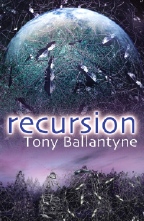Recursion
Tony Ballantyne
Tor UK / Pan Macmillan
UK Trade Paperback First
ISBN 1-405-04139-0
Publication Date: 07-16-2004
345 Pages; £12.99
Date Reviewed: 06-23-04
Reviewed by: Rick Kleffel © 2004

REFERENCES
COLUMNS
|
|
|
RecursionTony BallantyneTor UK / Pan MacmillanUK Trade Paperback FirstISBN 1-405-04139-0Publication Date: 07-16-2004345 Pages; £12.99Date Reviewed: 06-23-04Reviewed by: Rick Kleffel © 2004 |
|
|
REFERENCES |
COLUMNS |
Science fiction novels often turn on a mystery. But it's not a mystery of the type we find in the mystery genre, though there are any number of "science fiction mysteries" that involve precisely that type of mystery; crime, criminals, deception, murder. No, many science fiction novels have a mystery inherent in their futuristic setting; how did our world become the world depicted in the novel? Often that mystery can be used as the driving force of the novel to generate narrative tension as the readers keep flipping to pages to find what events brought us from here to there. It's only fitting that Tony Ballantyne's novel is titled 'Recursion', then, because he offers three points in the future; 2051, 2119 and 2210, each segment connected to the other -- and to our present -- in ways that are, as the novel starts, quite obscure. Rest assured that Ballantyne will connect them, and in the process, he'll thrill science fiction readers who will discover a powerful, thought-provoking and entertaining new voice that re-invigorates the genre for any who thought it might be slacking or lacking.
'Recursion' begins in 2210, when Herb, a spoiled rich kid, returns to the planet he seeded with self replicating robots (VNMs, or Von Neumann Machines, after John Von Neumann, the early 20th century scientist who first proposed them). His hopes that they have built a technological paradise in his absence are dashed by the nightmarish reality he finds -- a veritable sea of swarming insect-like machines, slowly consuming the entire planet. Worse, he's been caught by the Environment Authority, the EA, and agent Robert Johnston is clearly not going to cut him any slack. Then, we're with Eva Rye, in the year 2051. Stuck in a dead-end job at a burger joint where she can't even get promoted, she makes a drastic decision to escape the ever-present nanny-state that ensures everyone is healthy, if not happy. Finally, Constantine Storey, in the year 2119, arrives at Stonebreak, an early VNM-built city where he's to meet with a mysterious group that is on the brink of its own momentous decision. Three characters, three fairly simple-seeming, straightforward threads are laid out with economy, grace and an admirable clarity and sense of humor.
But it's the building behind the story that's the star here. Ballantyne has put together an ingenious novel, positively bristling with ideas, memorable characters and gripping storylines that do indeed manage to meet most memorably before the novel is complete. While even a complete discussion of the plot would not ruin the excellent writing that ties this book together, this review is not here to tell the story; that's Ballantyne's job. In fact, it's best not to look at the back cover or the various summaries you'll find on Internet bookseller sites, which will ruin a deliciously humorous surprise. Humor is only part of the recipe that makes this such an enjoyable novel. Like any great work of science fiction, 'Recursion' turns on not just one, but a number of thought-provoking ideas.
Readers can expect to find in 'Recursion' some finely-tuned paranoia about the on-going and ever increasing surveillance to which we allow ourselves to be subjected and the reasons that enable us to give away our quite alienable right to privacy. Perception, reality and hallucination are also key concepts here, in the finest tradition of Stanislaw Lem and Philip K. Dick. And of course, the title itself applies to both the levels of reality that Ballantyne evokes and the VNMs. Those pesky little robots have enormous implications, as does indeed any form that manages to reproduce. The Fermi Paradox -- Where are the damn Aliens? -- gets a thorough going-over, as do corporate morals, or more properly, the lack thereof.
For all the great ideas banging about in this book, it's the writing on the prose, plot and character levels that ties it all together and makes this novel so enjoyable. Ballantyne's prose is admirably stripped down, with just enough of a smirk running through it to keep it from sliding into the overly-serious. His characters are all memorable, funny, quirky and just flawed enough to be people that readers will welcome every time a new set of scenes is up. And the plotting that runs through each thread as well as the over-arching plot that ties them together is properly gripping and mind-boggling. Not too much now; just enough to make the reader want to thank the writer for stimulating those thoughts running through the brain upon having read the novel.
For a first novel, 'Recursion' is quite remarkable, though not entirely problem-free. But by the time Ballantyne is forced to resort to an info-dump -- which is exactly how he labels it -- events and characters have coalesced into an unstoppable force. The reader cannot help but be caught up in pursuing that mystery, that conundrum that connects our world to Ballantyne's and his worlds to one another. This is a mystery of epic proportions, a mystery that sums up the appeal of great science fiction; it can ask how our world came to be, then answers the question with verve and imagination. 'Recursion' lives up to its title in a number of fashions, but in one way that overshadows the rest. Upon finishing the novel, the reader will be tempted to go back and read it again.